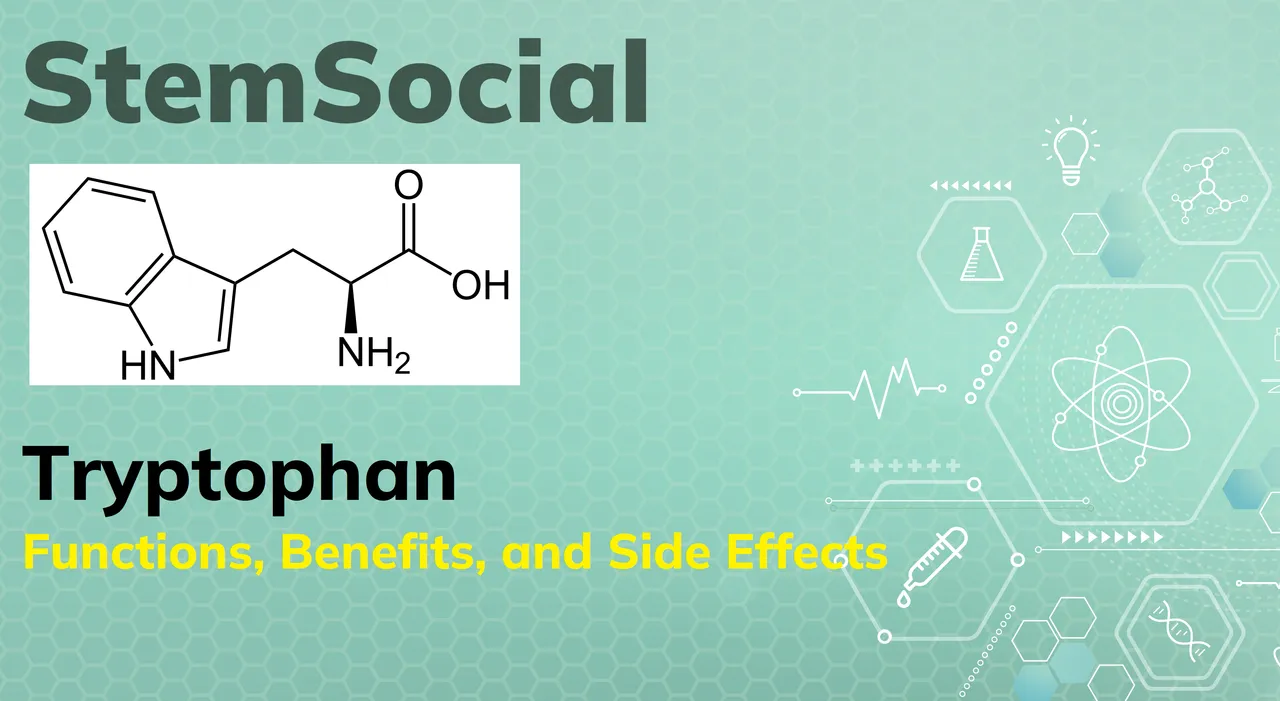 source
sourceBack again with me @workaholic666 on StemSocial, today I will discuss about essential amino acids that are important for the human body. The Amino Acid that I discussed this time is Tryptophan or L - Tryptophan. You guys can read my previous posts which discuss about other essential Amino Acids:
- Histidine: Functions, Benefits, and Potency in the Human body
- Methionine - Functions, Benefits, and Side Effects
About Tryptophan
Tryptophan is one of the essential amino acids that are so necessary for the human body because this amino acid cannot be synthesized by our bodies, it must be supplied from the food we eat. Tryptophan is needed by the human body to produce protein and maintain healthy brain function. In addition, tryptophan is also known to have several significant health benefits.
Tryptophan contributes to the production of the neurotransmitter serotonin, which is responsible for regulating mood, sleep and appetite. Serotonin also helps reduce pain, depression, and anxiety. When tryptophan is absorbed by the body, it is converted into 5-HTP (5-hydroxytryptophan), which is then converted again into serotonin. This is the reason why many people who have sleep disorders or mood problems are often advised to eat foods rich in tryptophan.
Tryptophan is also necessary for the production of niacin or vitamin B3. Niacin helps maintain healthy skin, digestive system and nerves. The body also uses tryptophan to produce melatonin, a hormone that helps regulate sleep cycles.
Tryptophan's primary use is to help maintain brain health and improve mood. A deficiency of tryptophan in the diet can lead to mental health problems like depression, anxiety disorders, insomnia and bipolar disorder. Taking tryptophan can help treat these problems and improve overall brain health. In the other side, taking high doses of tryptophan can cause nausea, vomiting, diarrhea, headaches, and mood swings. In rare cases, taking high doses of tryptophan can cause eosinophilia-myalgia syndrome (EMS), which is a life-threatening disease.
The following are some examples of foods that contain tryptophan:
Chicken - Chicken is one of the foods richest in tryptophan. 100 grams of chicken breast contains around 350-400mg of tryptophan.
Nuts - Nuts such as almonds, cashews, and peanuts contain tryptophan. For example, 100 grams of almonds contain about 250mg of tryptophan.
Cheese - Cheese is a food rich in tryptophan. For example, 100 grams of cheddar cheese contains about 330mg of tryptophan.
Eggs - Eggs contain many nutrients and amino acids including tryptophan. 100 grams of a raw egg contains around 160mg of tryptophan.
Conclusion
Tryptophan is one of nine essential amino acid that is needed for human body like another essential protein. This amino acid is crucial for protein synthesis and supporting normal brain function. In addition, tryptophan also has significant health benefits, like helping regulate mood, sleep, and appetite. Tryptophan is also necessary for the production of niacin or vitamin B3. Niacin helps maintain healthy skin, digestive system and nerves. The body also uses tryptophan to produce melatonin, a hormone that helps regulate sleep cycles.
However, as is the case with all substances the body takes in, excessive consumption of tryptophan can also cause unwanted side effects. Therefore, it is so important to consume tryptophan at the appropriate dose and follow the advice of a doctor or nutritionist if you have health problems that require special treatment.


